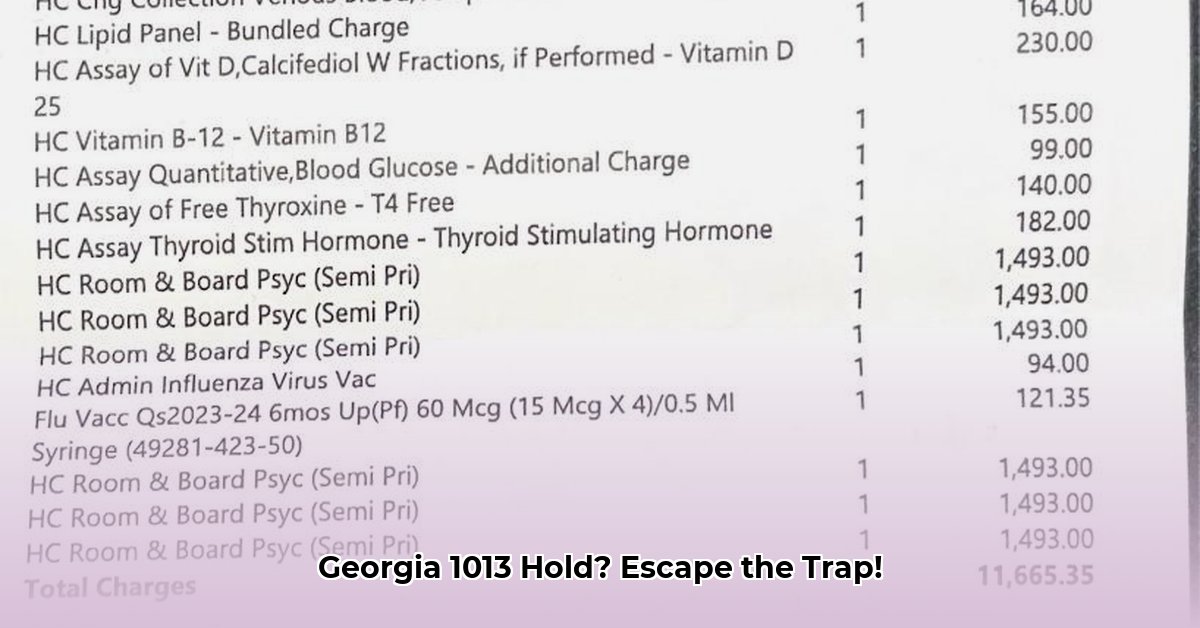
Being placed on a 1013 hold in Georgia is undoubtedly frightening and confusing. This guide provides clear steps to understand your situation, protect your rights, and regain your freedom as quickly and safely as possible. Remember, you are not alone, and help is available.
Understanding the 1013 Hold
A 1013 hold is Georgia's process for short-term, involuntary commitment to a mental health facility. It means a healthcare professional believes you pose an immediate risk of harm to yourself or others, requiring temporary hospitalization. This is a safety precaution, not a punishment. The hold lasts for a maximum of 72 hours, excluding weekends and holidays. This period allows professionals to assess your condition and determine the best course of action.
Your Rights During a 1013 Hold
Your rights are protected under Georgia law (O.C.G.A. Title 37, Chapter 3). You are not powerless. Crucially, you have the right to request your release (Forms 1010, 1011) at any time by communicating your wishes clearly to facility staff. If deemed appropriate by medical professionals after evaluation, you must be discharged. If the hold extends beyond 72 hours, you have the right to a hearing (Form 1021) to challenge the continued involuntary commitment. Acting promptly is vital.
Steps to Take: A Practical Guide
Follow these steps to navigate your situation effectively:
Clear Communication: Calmly and firmly inform staff of your desire to be discharged. Clearly explain why you believe the hold is no longer necessary. Respectful but assertive communication is key.
Meticulous Documentation: Keep a detailed record of every interaction: date, time, individuals involved, topics discussed, and outcomes. Note any medications administered, dosages, and any side effects experienced. This documentation is crucial if you need to challenge the commitment.
Seek Immediate Legal Counsel: Contact an attorney specializing in mental health law. They understand the complexities of involuntary commitment and can protect your rights. An attorney can expedite your release.
Enlist Support: Inform family, friends, or trusted individuals. They can provide emotional support, advocate for you, and assist with communication and documentation. Having a support system significantly improves outcomes.
Utilize Advocacy Groups: Several organizations offer assistance to individuals facing involuntary commitments. These groups provide information, guidance, and connect you with additional resources. They can advocate for your interests.
Prepare for a Hearing: If a hearing is scheduled, gather relevant medical records, personal statements, and supportive documentation. Your attorney can help prepare and present your case effectively. Your testimony is crucial.
Available Resources and Support
Many resources help individuals facing involuntary commitment. Local legal aid organizations, mental health advocacy groups, and peer support networks can provide valuable assistance and guidance. Don't hesitate to seek support; it's a sign of strength.
Additional Considerations: Involuntary Medication
If involuntary medication is administered, immediately address this with your doctor, lawyer, and any advocate. This raises significant legal and ethical concerns regarding informed consent and potential side effects.
Key Takeaways: Regaining Control
- A 1013 hold is a temporary measure for immediate safety.
- You possess significant rights under Georgia law.
- Proactive steps – legal counsel, documentation, and support – maximize your chances of a positive outcome.
- Utilize available resources to improve the situation.
Remember, you have rights, and you are not alone. This situation is challenging, but by taking action, you can improve your chances and regain your freedom.